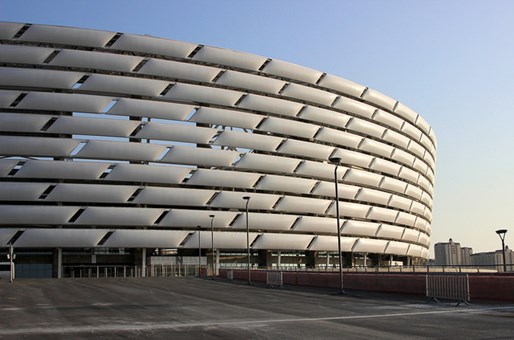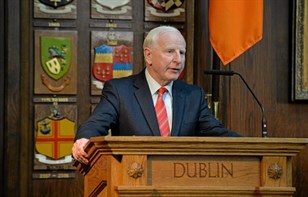Baku 2015: It’s just a game

The new National Stadium in Baku, Azerbaijan. Photo: Trevor Claringbold/Flickr
09.06.2015
By Lars AnderssonEuropean sport has to make its marks. Like every other continent, it wants to celebrate and promote its heroes on the sporting field. That is why, back in 2012, the European Olympic Committees decided to create a new event, the European Games, where 6,000 athletes from 50 countries vie for international glory in 20 sports.
On 12 June, the first European Games will be launched in Baku, Azerbaijan, a country situated at the crossroads of Eastern Europe and Western Asia and ruled by Ilham Aliyev. At last presidential election Aliyev received 85 percent of the votes – a stark reminder of the country’s past as a Soviet Republic. And for years the Azerbaijani government has had a poor human rights record with around 100 political prisoners, no freedom of the press, massive corruption and fixed elections.
Sweeping crackdown
Or as Human Rights Watch summarizes it in ‘Tightening the Screws’ and its ‘World Report 2015’: “Azerbaijan’s record on freedom of expression, assembly, and association has been on a steady decline for some years, but it has seen a dramatic deterioration since mid-2012. Since then the government has been engaged in a concerted effort to curtail opposition political activity, punish public allegations of corruption and other criticism of government practices, and exercise greater control over nongovernmental organizations. It has done so by arresting and imprisoning political activists on bogus charges, adopting restrictive legislative amendments, consistently breaking up public demonstrations in the capital, and failing in its duty to investigate and punish those responsible for violent attacks and smear campaigns against critical journalists.”
Jane Buchanan, director of the European and Central Asia Division in Human Rights Watch, offers a similar description of the political situation in Azerbaijan:
“The Azerbaijan government tolerates little criticism and has gradually closed the space for independent voices over the last several years. In the last year alone, it has undertaken a sweeping crackdown on human rights defenders and journalists, detaining and imprisoned dozens on fabricated, but very serious, criminal charges, including treason, financial crimes, narcotics possession, etc. Many other journalists and activist have fled the country or gone into hiding.”
“The authorities have also shut down the work of many independent organizations by raiding them and closing them and by freezing organizations bank accounts and bank accounts of their directors. The authorities have also put in place a series of laws that make it impossible for independent groups to receive funding.”
No politics here
Despite the above allegations – and despite a regime that is, at best, on the edge of democracy – Azerbaijan will be the place where Europe will salute its athletes. And the decision to host the Games there is something the European Olympic Committees (EOC) is completely satisfied with:
“The EOC will not seek to impose any political agenda on a sovereign state or society. However, we have sought and received the assurance from the authorities in Azerbaijan that the principles of the Olympic Charter will be protected throughout the European Games in June,” Patrick Hickey, EOC’s president, says to Sport Executive.

EOC president Patrick Hickey. Photo: EOC
“Azerbaijan made a compelling pledge to the EOC to host the inaugural European Games back in 2012. Their hosting concept was innovative and technically excellent and they offered an assurance that all Games infrastructure would be ready on time and delivered to the highest international standards, with strong legacy plans to elevate sport in the region. These was the only criteria the EOC considered when selecting Baku as the host city of the European Games because they are the only criteria that the EOC, as a sports organisation, is qualified to consider,” Patrick Hickey continues.
Human rights defenders are less convinced about the EOC’s rationale for awarding the Games to Baku. The Sport and Rights Alliance (see box), for example, demanded in April 2015 that Azerbaijan frees all of its ‘political’ prisoners before the Games.
“The EOC are in a unique position to raise the pressing human rights concerns with President Aliyev. By remaining silent, the EOC risk sending a message that it is acceptable for the Azerbaijani government to silence critics while hosting an event that, according to the Olympic Charter, should stand for human dignity and sport at the heart of the harmonious development of society,” Eduard Nazarski, Amnesty International Netherlands director, says to Sport Executive.
Tribute to a mafia boss
But the Games will go on, regardless of the Olympic Charter. President Aliyev has used millions of dollars to build a 65,000 seat stadium and a state-of-the-art gymnastics arena to project himself and the state of Azerbaijan on to the international stage in the best way possible. As such, the event will pay a tribute to a man who, according to the US Embassy in Azerbaijan – published on WikiLeaks website, is “a mafia crime boss, leaving many to wonder if his government is actually democratic and whether people truthfully believed that Azerbaijan does not repress minority populations.”
Or as Jane Buchanan from Human Rights Watch explains, President Ilham Aliyev’s strategy to promote Azerbaijan as a modern state by hosting sports events:
“The Azerbaijan government and President Aliyev appears to crave the prestige and spotlight that major international events can provide. The hosting of events like the European Games seems designed to project a positive image of Azerbaijan internationally, and perhaps domestically, although it’s hard to know how the general public in Azerbaijan perceives these events. Azerbaijan has aspirations to host and has bid to host a summer Olympics, so they likely see events like the European Games as helping to increase its changes to host that kind of event,” Jane Buchanan explains.
The bill is on me
And President Aliyev has increased his changes. He has paid for the prestige of hosting the first European Games - not just the millions of dollars he has spent on stadiums and infrastructure, but also cash to the National Olympic Committees in Europe and the EOC. In February, English newspaper The Guardian revealed to the public that Azerbaijan is paying for the British team to compete in Baku in June.
“The net cost we’re hoping will be neutral for Team Great Britain,” the Team GB chef de mission Mark England told The Guardian.
Sport Executive wrote to the British Olympic Association and other National Olympic Committees about the fees from Azerbaijan, but have received either ‘no answers’ or ‘no comments’. But Patrick Hickey confirms that President Aliyev is paying well:
“As a requirement of the host city contract, BEGOC (Azerbaijan’s National Olympic Committee, ed.) will also provide funding support to athletes and officials just like other Continental Games Organizing Committees. Athletes are at the heart of any great sport event, and for us it is only right that the bodies who prepare these athletes and give them the stage to perform are compensated for their efforts,” he says and continues:
“And after the European Games, the EOC as the governing body will distribute a fund of 2.5 millions euros from the Games revenue across all the European NOCs and the European Federations of all participating sports.”
So while President Aliyev foots the bill, athletes will compete, the audience will cheer in Baku this June in the shadow of a national crackdown on human dignity and rights. Just as it is written in the Olympic Charter or…
More information
- European Olympic Committee's official website about the European Games:
http://www.eurolympic.org/en/sports-events/the-european-games.html?view=events - The official website of the 2015 Baku Games
http://www.baku2015.com/ - Human Rights Watch information about Azerbaijan:
http://www.hrw.org/europecentral-asia/azerbaijan - Read the chapter on Azerbaijan from HRW's World Report 2015:
http://www.hrw.org/world-report/2015/country-chapters/azerbaijan
This article was previously published in online magazine Sport Executive





